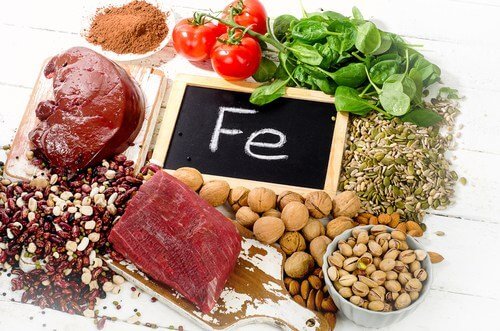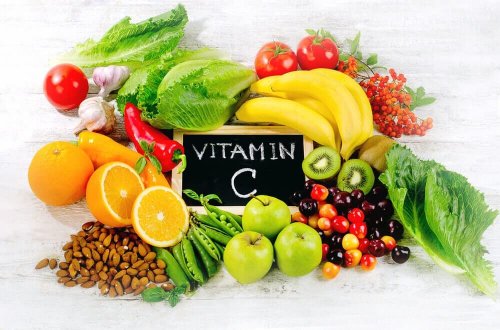Iron Deficiency Anemia: Dietary Guidelines

Iron deficiency anemia occurs due to a deficiency in the quality and quantity of hemoglobin, a molecule found in red blood cells. Hemoglobin is important to our body because it transports oxygen from the lungs to the rest of the tissues of the body.
When hemoglobin can’t transport oxygen to the body tissues, we develop iron deficiency anemia. This disorder is, therefore, an anomaly in normal blood cell count. It involves a reduction or a lack of red blood cells that can’t properly transport oxygen throughout the blood.
Among the symptoms that an iron deficiency anemic person may experience are:
- Chronic fatigue and lethargy
- General discomfort
- Insomnia
- Dizziness
- Paleness and shortness of breath
- An irregularity in their menstrual cycles
- Unusual heart rhythm and/or palpitations.
If anemia is diagnosed and treated quickly, then there’ll be no consequences. However, if it’s not revealed early, it may aggravate the situation of a person with cardiac problems or respiratory failure.
You should always check with your doctor before taking iron supplements. An excess of iron consumption can also be harmful.
How to Overcome Iron Deficiency Anemia
Here are some tips you can help you overcome iron deficiency anemia.
1. Include More Iron in Your Diet

Our first tip to prevent and correct iron deficiency anemia is to make sure to include this mineral in your diet. Keep in mind that iron is necessary for the production of hemoglobin. In most cases, iron deficiency is caused by insufficient consumption of foods that are rich in this mineral.
This condition is more prevalent among children and young women. This is not only because menstrual flow can cause excessive blood loss and deplete iron reserves, but also because extreme diet fads and even vegetarian and vegan diets tend to favor a lack of iron.
Note that the iron that’s most easily absorbed by the body is that from meat, poultry, and fish sources. Other foods such as vegetables, fruits, cereals, eggs, and nuts also contain iron, but this is absorbed in lesser quantities.
Further, it isn’t recommended to take iron supplements if the doctor considers that you don’t need it. Iron supplements, when taken in high doses, lead to constipation and black stool. In turn, unnecessary iron supplements can disguise a serious problem such as bleeding from the digestive system.
Read this article: 5 Ways to Increase Iron Levels in Your Blood
2. Limit Your Alcohol Consumption
You should know that alcoholism and anemia are related conditions in some people. As in many cases, they’re both the result of poor nutrition. When consuming alcohol, the liver must do extra work to eliminate it. In addition, this organ is in charge of supplying iron to the rest of the human body.
For this reason, the intake of alcohol can aggravate the symptoms of iron deficiency anemia. So, moderate consumption is recommended, as drinking too much alcohol can also lead to iron deficiency.
As if that wasn’t enough, keep in mind that people who consume excessive amounts of alcohol tend to have defective red blood cells – these are destroyed before the end of their natural life cycle.
3. Include Sources of Folic Acid
Folate, also known as folic acid, is a B-type vitamin that accelerates the division of red blood cells and, therefore, promotes the proper transportation of oxygen to the rest of the body. In this regard, people with iron deficiency anemia should include foods that are high in folate in their diets.
Among the foods that are high in folate, there are citrus fruits, leafy greens, nuts, seeds, and legumes. However, do keep in mind that the folate these contain is highly sensitive to heat. Therefore, avoid cooking these foods too much and opt for cooking methods such as steam or the oven.
4. Consume More Vitamin C

Vitamin C increases the absorption of iron if it originates from a plant source.
To improve the dietary intake of iron of plant origin, it’s essential to increase consumption of vitamin C. This vitamin improves the absorption of non-heme iron from plant sources.
Make sure to include vitamin C in your regular diet. For example, eat one orange or the fresh juice of a lemon once a day. Also, other fruits that contain large amounts of vitamin C are grapefruit, cranberries, bananas, kiwi, etc.
5. Iron Deficiency Anemia: Limit Your Tea and Coffee Intake
Tea and coffee are rich in tannins. These are vegetable substances that limit the absorption of iron in our body. For this reason, you should limit your consumption, especially during regular meals.
If you’re taking iron supplements, it’s also important not to consume tea or coffee for several hours before and after taking said supplements. In addition, these shouldn’t be taken at the end of a meal, but in the afternoon or early morning instead.
Finally, remember that iron deficiency anemia is the most common form of this condition. This just means your intake of food with iron is insufficient or it doesn’t compensate for the losses related to acute or chronic bleeding.
Keep in mind that in order to restore the right balance of red blood cells it’s also necessary to evaluate the source of the problem. As always, talk to your MD about it.
All cited sources were thoroughly reviewed by our team to ensure their quality, reliability, currency, and validity. The bibliography of this article was considered reliable and of academic or scientific accuracy.
- Cardero Reyes, Yusimy, Sarmiento González, Rodolfo, & Selva Capdesuñer, Ana. (2009). Importancia del consumo de hierro y vitamina C para la prevención de anemia ferropénica. MEDISAN, 13(6) Recuperado en 17 de julio de 2020, de http://scielo.sld.cu/scielo.php?script=sci_arttext&pid=S1029-30192009000600014&lng=es&tlng=es.
- Bastos Oreiro, M.. (2009). Anemia ferropénica: Tratamiento. Revista Española de Enfermedades Digestivas, 101(1), 70. Recuperado en 18 de julio de 2020, de http://scielo.isciii.es/scielo.php?script=sci_arttext&pid=S1130-01082009000100010&lng=es&tlng=es.
- MedlinePlus enciclopedia médica. (2018). Anemia ferropénica. Retrieved January 10, 2019, from https://medlineplus.gov/spanish/ency/article/000584.htm
- Mayo Clinic (2019). Anemia por deficiencia de hierro. https://www.mayoclinic.org/es-es/diseases-conditions/iron-deficiency-anemia/symptoms-causes/syc-20355034.
- Ioannou, GN, Dominitz, JA, Weiss, NS, Heagerty, PJ y Kowdley, KV (2004). El efecto del consumo de alcohol sobre la prevalencia de sobrecarga de hierro, deficiencia de hierro y anemia por deficiencia de hierro. Gastroenterología, 126 (5), 1293-1301. https://doi.org/10.1053/j.gastro.2004.01.020
- Zijp, IM, Korver, O. y Tijburg, LBM (2000). Efecto del té y otros factores dietéticos sobre la absorción de hierro. Critical Reviews in Food Science and Nutrition, 40 (5), 371–398. https://doi.org/10.1080/10408690091189194
This text is provided for informational purposes only and does not replace consultation with a professional. If in doubt, consult your specialist.








